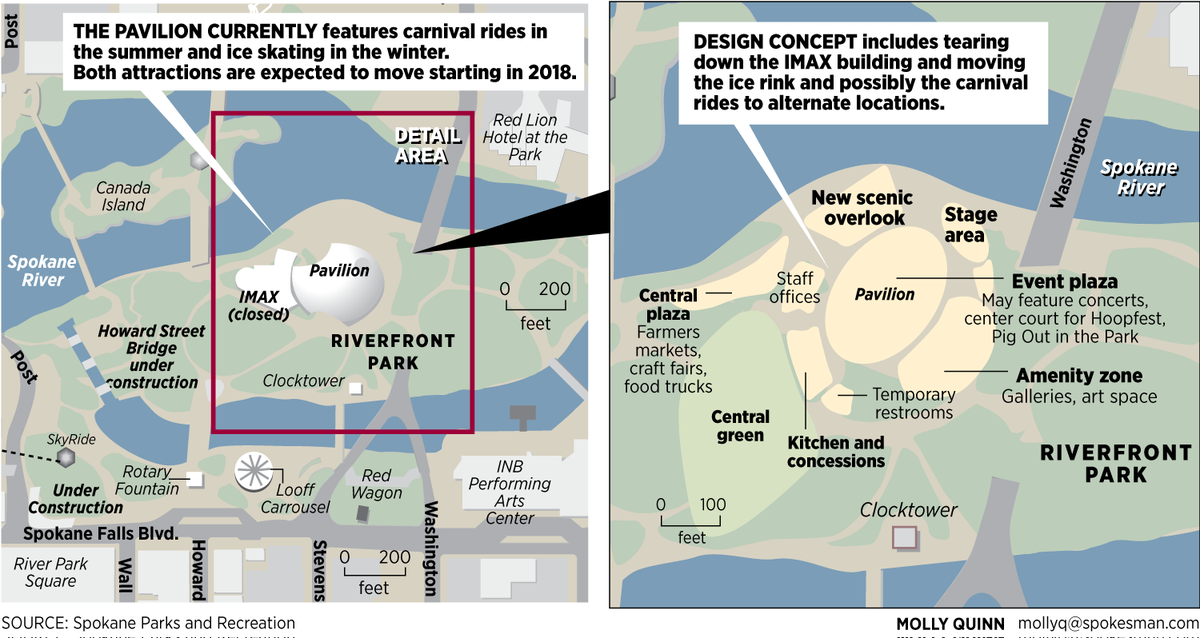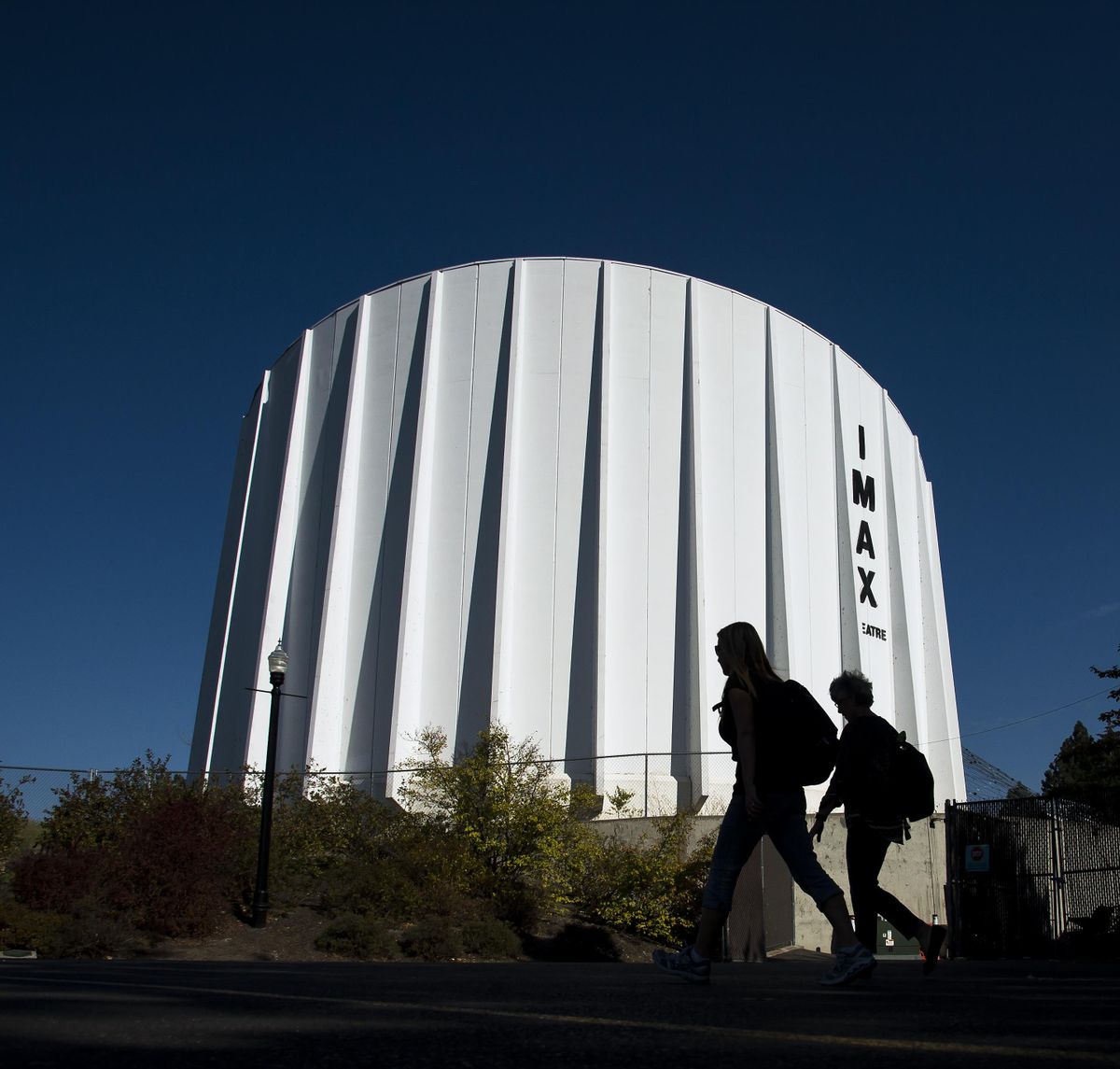Imax theater in Riverfront Park headed for demolition; fate of pavilion rides still in question
Seagulls fly past the ferris wheel ride, Sept. 7, 2016, in Spokane's Riverfront Park. (Dan Pelle / The Spokesman-Review)Buy a print of this photo
Riverfront Park’s iconic Imax theater will be demolished as part of the park’s redevelopment.
The Spokane Park Board chose last week to tear down the aging attraction, built after Expo ’74, after talking about its fate for several years.
“I think when you make decisions, you need to go with decisions,” Park Board member Susan Traver said Sept. 23. The Park Board held a special meeting to discuss design plans for the proposed $19 million pavilion that will anchor the newly redesigned Riverfront Park.
A master plan for the park’s redevelopment, agreed to in 2014, called for closing the Imax because of declining revenues. After an attendance peak in 2005, the attraction has seen revenues plummet following the opening of the Imax screen at the AMC cinema in nearby River Park Square and the loss of licensing to show big-budget Hollywood films in 2009.
Internal park numbers show the theater making a profit of more than $67,000 in 2005, compared with a loss of more than $164,000 in 2012, before the Parks Department began instituting cost-saving measures.
The Park Board approved a planning document that removed mention of keeping the Imax theater or its foundation in the design of the new building. Sept. 23 was the last day all Park Board members had a chance to provide input as a group before the document goes out to a design firm.
The Park Board hopes to approve a contract for the pavilion design and construction by the end of March, and the pavilion is scheduled to open by March 2019.
The decision about the Imax theater comes amid concerns expressed by former Park Board officials, chief among them former Park Board President Randy Cameron, about mounting costs of the redevelopment project and a delay in getting shovels into the ground. The Park Board recently said design of the first planned signature attraction at the park, an ice ribbon skating feature, was too costly and its opening would be delayed two months..
Hal McGlathery, who oversaw Riverfront Park from 1982 to 1996, has formed a nonprofit to combat the plans to demolish the Imax and also to protect the amusement rides that fill the existing pavilion every summer. McGlathery said he was not notified of the Sept. 23 meeting, which did not include public testimony, and he thought the decision was a mistake.
“None of the efforts to save the Imax have resonated with Park Board members. They’ve never created a venue to discuss it with consumers,” McGlathery said.
Rides don’t fit with park’s new vision
Earlier this summer, McGlathery accused park planners, including Parks Director Leroy Eadie, of a lack of transparency in their reporting of expenses in the 2014 master plan that called for demoliton of the Imax and removal of the rides.
McGlathery pointed to numbers he’d obtained from city accountants that showed the attractions operated in the black from 2010 to 2012, not at a loss as was reported in the master plan.
Eadie said he’s since met with McGlathery and explained that the master plan incorporated indirect costs and depreciation for the rides that aren’t reflected in the numbers McGlathery got from the city. McGlathery now agrees with the Parks Department’s numbers, but he notes that the Skyride and Looff Carrousel also operate at losses but are retained in future plans for the park.
McGlathery said this week he believes the decision to demolish the theater threatens the future of other amenities he says are profitable and key to attracting families to the park.
“I’m afraid the rides are going to be next,” McGlathery said. “It just seems irresponsible.”
McGlathery’s group, calling themselves Save Affordable Family Entertainment at Riverfront Park, donned red T-shirts with the acronym SAFER and packed a Park Board meeting earlier this month. They urged Park Board members not to eliminate local attractions that provide cheaper thrills than area theme parks.
Steve Corker, a former Park Board and City Council member who supports McGlathery’s group, told the panel he hoped some of the delays that have plagued the redevelopment would be a chance to reconsider the rides’ importance in the park. Corker hopes the rides will be relocated within the park.
“Money has not always been the issue,” Corker said. “The issue has been creating a Riverfront Park with activity that’s viable for all ages and all of our citizens.”
In an interview, Spokane Park Board President Chris Wright agreed, saying profitability isn’t the most important guiding principle when designing public spaces such as parks.
“We want to make the park as sustainable as possible. By the same token, it’s a park,” he said. “It’s open space. There are very few open spaces in this city that generate revenues.”
But Wright and others on the board have said the rides don’t fit in with the vision for a new pavilion, pitched last week as Spokane’s “Space Needle” by Ted McGregor, publisher of the Inlander and chairman of the subcommittee overseeing the redevelopment of Riverfront Park.
Touring the park last week Teri and Steve Palmer said they approve of adding amenities to the park, as long as the space retains its sense of wonder from 40 years ago. The couple both graduated from Gonzaga University and remember visiting Expo ’74.
“I don’t know if it needs a revamping,” Teri Palmer said. “But anything can use a refreshing.”
Roger Crum, the interim director of the Parks Department who oversaw a $43 million bond resulting in construction of new pools and splash pads almost a decade ago, said whatever the scope of the work, it’s important to begin construction quickly when taxpayer dollars are involved.
“When you have a bond, you have to move fairly quickly and decisively. You need to keep moving forward, and you can’t delay. You are always going to come up with unexpected costs,” Crum said.
Nothing else can be built in Imax’s place
Both Eadie and Wright said last week there’s still “a small window” that the rides and large-projection educational films could fit into the new park’s offerings.
“We own the rides outright,” said Eadie. “We may look at them and say, that’s an asset that we deploy somewhere else in the park. Or maybe we trade all those rides in and get a really good one.”
But the Park Board has no plans to return the rides – which were mothballed earlier this month and will not return to the park in 2017 under a proposed budget – to the pavilion, Wright said.
“That’s probably pretty settled,” he said.
The design for a regional playground on the north side of the park hasn’t been agreed upon, though Park Board members have hinted they’d be interested in installing the rides there on a temporary basis in the summer. But the most recent rendering of that portion of the park didn’t include space for rides.
Riverfront Park’s proposed 2017 budget calls for the Imax theater and rides to go dark because it’ll be too hard to get to them during construction. Internal numbers show the park would require a $1.2 million subsidy next summer if the rides, mini-golf, Imax and other attractions stay open. By closing them, that number shrinks to $600,000 because of saved costs on labor and maintenance, Eadie said.
“We always knew 2017 was going to be our toughest construction year,” he said. The Park Board will vote on the proposed budget next month.
Before the board selected demolition for the Imax theater, McGregor urged his colleagues to consider leaving the base of the theater as a new overlook spot for the Spokane River. The board followed a recommendation by city staff, however, that keeping the base wouldn’t be feasible.
Once the Imax is demolished, nothing else can be built in that spot; current environmental standards, which were not in place when the theater opened in 1978, prevent shoreline construction that close to the river.



